NHS Leadership, Training, Talent Management & Performance Research
VerifiedAdded on 2023/06/15
|10
|2552
|421
Report
AI Summary
This report provides an analysis of people management strategies within the National Health Service (NHS) in the United Kingdom, focusing on leadership and management styles, training and development programs, and talent management approaches. It highlights the NHS's use of transformational leadership and attribution theory, emphasizing the importance of creating a safe working environment and addressing social determinants of health. The report also examines various training methods employed by the NHS, including on-site training, personalized programs, and simulation training, to enhance the skills and knowledge of healthcare professionals. Furthermore, it explores key areas of talent management, such as strategic workforce planning, learning and motivation, and talent acquisition and retention, which underpin performance management within the organization. The report concludes with recommendations for the NHS to improve its people management practices, including adopting diverse leadership theories, enhancing patient engagement, and incorporating additional skills training for staff, ultimately aiming to improve the quality of healthcare services provided.
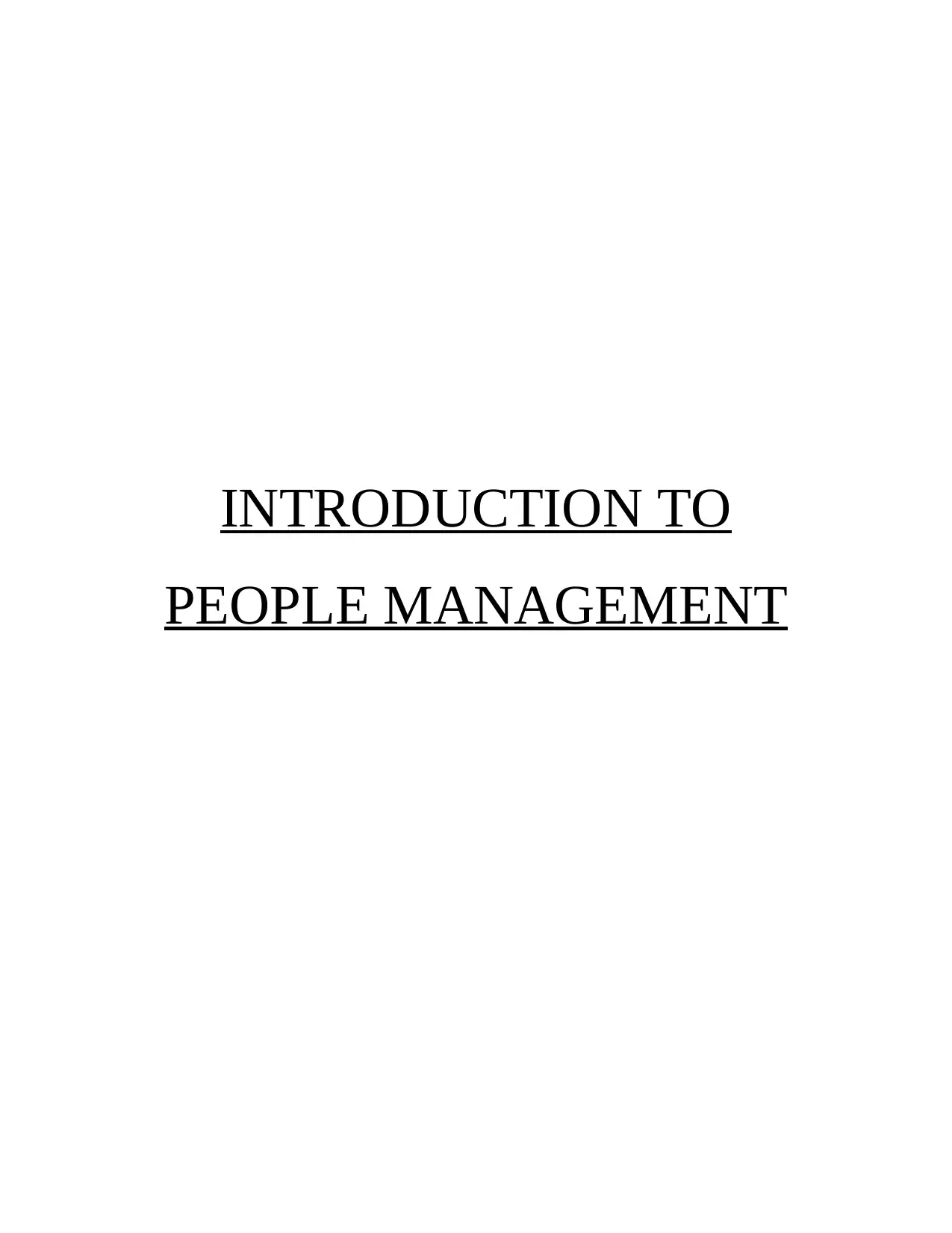
INTRODUCTION TO
PEOPLE MANAGEMENT
PEOPLE MANAGEMENT
Paraphrase This Document
Need a fresh take? Get an instant paraphrase of this document with our AI Paraphraser
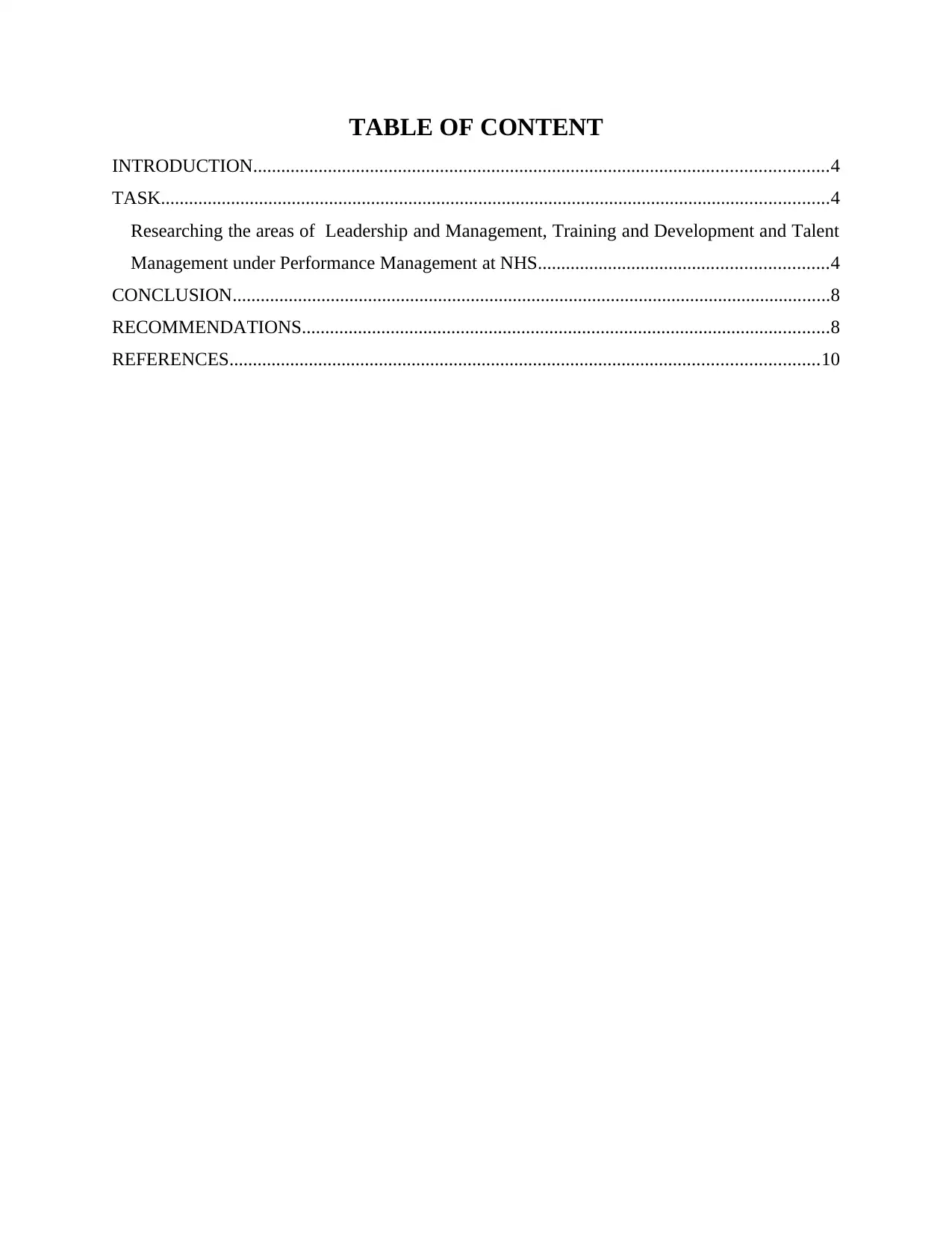
TABLE OF CONTENT
INTRODUCTION...........................................................................................................................4
TASK...............................................................................................................................................4
Researching the areas of Leadership and Management, Training and Development and Talent
Management under Performance Management at NHS..............................................................4
CONCLUSION................................................................................................................................8
RECOMMENDATIONS.................................................................................................................8
REFERENCES..............................................................................................................................10
INTRODUCTION...........................................................................................................................4
TASK...............................................................................................................................................4
Researching the areas of Leadership and Management, Training and Development and Talent
Management under Performance Management at NHS..............................................................4
CONCLUSION................................................................................................................................8
RECOMMENDATIONS.................................................................................................................8
REFERENCES..............................................................................................................................10

⊘ This is a preview!⊘
Do you want full access?
Subscribe today to unlock all pages.

Trusted by 1+ million students worldwide
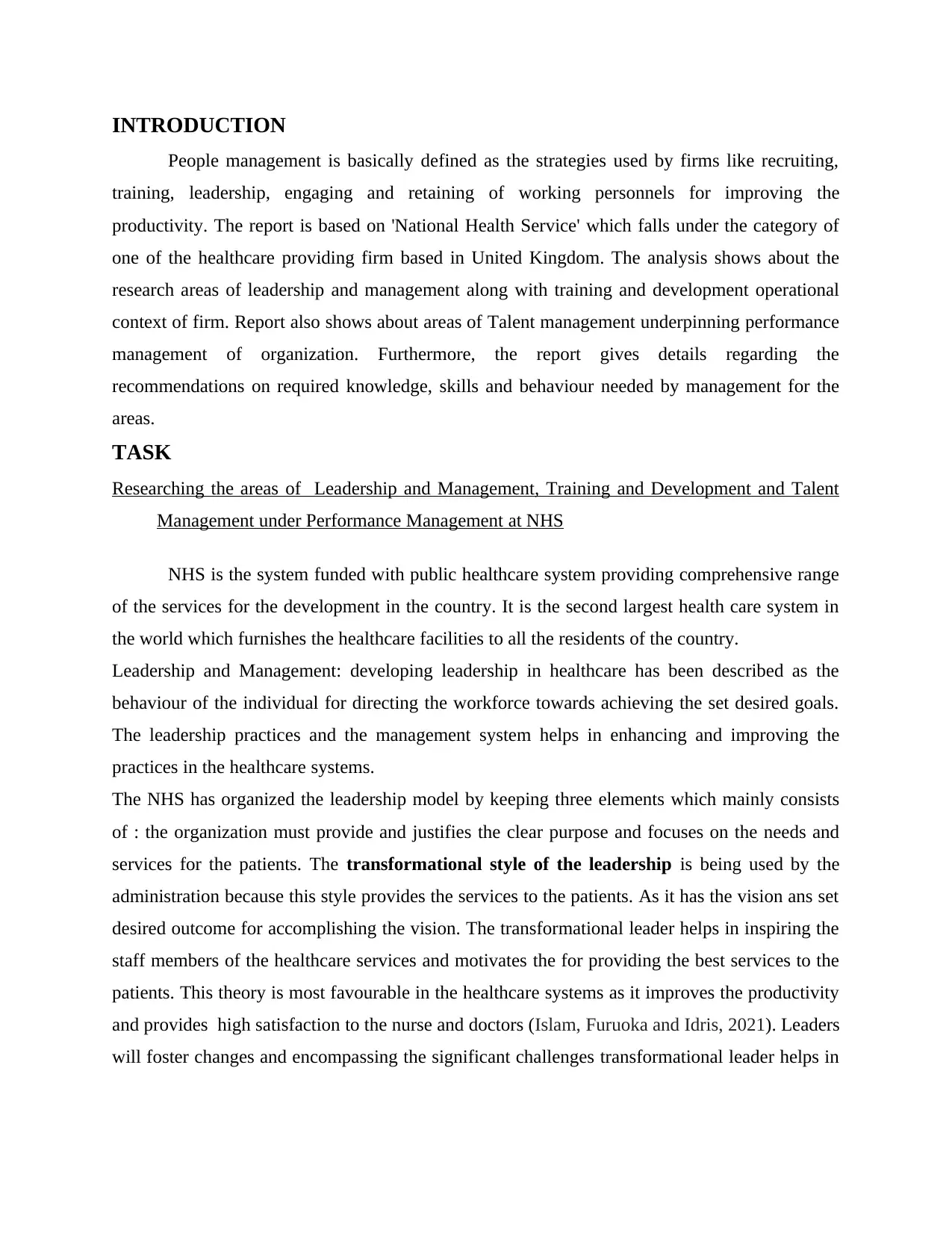
INTRODUCTION
People management is basically defined as the strategies used by firms like recruiting,
training, leadership, engaging and retaining of working personnels for improving the
productivity. The report is based on 'National Health Service' which falls under the category of
one of the healthcare providing firm based in United Kingdom. The analysis shows about the
research areas of leadership and management along with training and development operational
context of firm. Report also shows about areas of Talent management underpinning performance
management of organization. Furthermore, the report gives details regarding the
recommendations on required knowledge, skills and behaviour needed by management for the
areas.
TASK
Researching the areas of Leadership and Management, Training and Development and Talent
Management under Performance Management at NHS
NHS is the system funded with public healthcare system providing comprehensive range
of the services for the development in the country. It is the second largest health care system in
the world which furnishes the healthcare facilities to all the residents of the country.
Leadership and Management: developing leadership in healthcare has been described as the
behaviour of the individual for directing the workforce towards achieving the set desired goals.
The leadership practices and the management system helps in enhancing and improving the
practices in the healthcare systems.
The NHS has organized the leadership model by keeping three elements which mainly consists
of : the organization must provide and justifies the clear purpose and focuses on the needs and
services for the patients. The transformational style of the leadership is being used by the
administration because this style provides the services to the patients. As it has the vision ans set
desired outcome for accomplishing the vision. The transformational leader helps in inspiring the
staff members of the healthcare services and motivates the for providing the best services to the
patients. This theory is most favourable in the healthcare systems as it improves the productivity
and provides high satisfaction to the nurse and doctors (Islam, Furuoka and Idris, 2021). Leaders
will foster changes and encompassing the significant challenges transformational leader helps in
People management is basically defined as the strategies used by firms like recruiting,
training, leadership, engaging and retaining of working personnels for improving the
productivity. The report is based on 'National Health Service' which falls under the category of
one of the healthcare providing firm based in United Kingdom. The analysis shows about the
research areas of leadership and management along with training and development operational
context of firm. Report also shows about areas of Talent management underpinning performance
management of organization. Furthermore, the report gives details regarding the
recommendations on required knowledge, skills and behaviour needed by management for the
areas.
TASK
Researching the areas of Leadership and Management, Training and Development and Talent
Management under Performance Management at NHS
NHS is the system funded with public healthcare system providing comprehensive range
of the services for the development in the country. It is the second largest health care system in
the world which furnishes the healthcare facilities to all the residents of the country.
Leadership and Management: developing leadership in healthcare has been described as the
behaviour of the individual for directing the workforce towards achieving the set desired goals.
The leadership practices and the management system helps in enhancing and improving the
practices in the healthcare systems.
The NHS has organized the leadership model by keeping three elements which mainly consists
of : the organization must provide and justifies the clear purpose and focuses on the needs and
services for the patients. The transformational style of the leadership is being used by the
administration because this style provides the services to the patients. As it has the vision ans set
desired outcome for accomplishing the vision. The transformational leader helps in inspiring the
staff members of the healthcare services and motivates the for providing the best services to the
patients. This theory is most favourable in the healthcare systems as it improves the productivity
and provides high satisfaction to the nurse and doctors (Islam, Furuoka and Idris, 2021). Leaders
will foster changes and encompassing the significant challenges transformational leader helps in
Paraphrase This Document
Need a fresh take? Get an instant paraphrase of this document with our AI Paraphraser
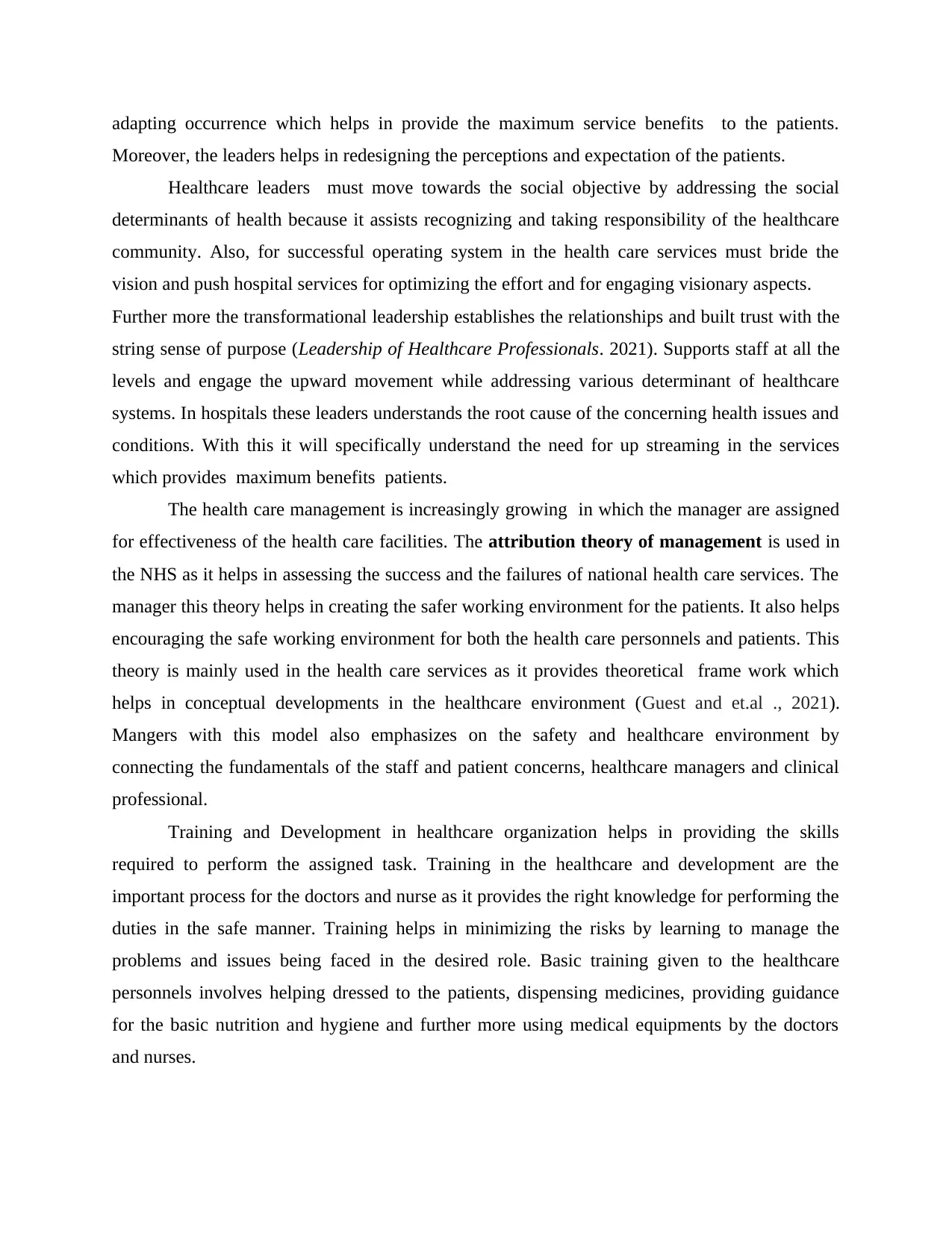
adapting occurrence which helps in provide the maximum service benefits to the patients.
Moreover, the leaders helps in redesigning the perceptions and expectation of the patients.
Healthcare leaders must move towards the social objective by addressing the social
determinants of health because it assists recognizing and taking responsibility of the healthcare
community. Also, for successful operating system in the health care services must bride the
vision and push hospital services for optimizing the effort and for engaging visionary aspects.
Further more the transformational leadership establishes the relationships and built trust with the
string sense of purpose (Leadership of Healthcare Professionals. 2021). Supports staff at all the
levels and engage the upward movement while addressing various determinant of healthcare
systems. In hospitals these leaders understands the root cause of the concerning health issues and
conditions. With this it will specifically understand the need for up streaming in the services
which provides maximum benefits patients.
The health care management is increasingly growing in which the manager are assigned
for effectiveness of the health care facilities. The attribution theory of management is used in
the NHS as it helps in assessing the success and the failures of national health care services. The
manager this theory helps in creating the safer working environment for the patients. It also helps
encouraging the safe working environment for both the health care personnels and patients. This
theory is mainly used in the health care services as it provides theoretical frame work which
helps in conceptual developments in the healthcare environment (Guest and et.al ., 2021).
Mangers with this model also emphasizes on the safety and healthcare environment by
connecting the fundamentals of the staff and patient concerns, healthcare managers and clinical
professional.
Training and Development in healthcare organization helps in providing the skills
required to perform the assigned task. Training in the healthcare and development are the
important process for the doctors and nurse as it provides the right knowledge for performing the
duties in the safe manner. Training helps in minimizing the risks by learning to manage the
problems and issues being faced in the desired role. Basic training given to the healthcare
personnels involves helping dressed to the patients, dispensing medicines, providing guidance
for the basic nutrition and hygiene and further more using medical equipments by the doctors
and nurses.
Moreover, the leaders helps in redesigning the perceptions and expectation of the patients.
Healthcare leaders must move towards the social objective by addressing the social
determinants of health because it assists recognizing and taking responsibility of the healthcare
community. Also, for successful operating system in the health care services must bride the
vision and push hospital services for optimizing the effort and for engaging visionary aspects.
Further more the transformational leadership establishes the relationships and built trust with the
string sense of purpose (Leadership of Healthcare Professionals. 2021). Supports staff at all the
levels and engage the upward movement while addressing various determinant of healthcare
systems. In hospitals these leaders understands the root cause of the concerning health issues and
conditions. With this it will specifically understand the need for up streaming in the services
which provides maximum benefits patients.
The health care management is increasingly growing in which the manager are assigned
for effectiveness of the health care facilities. The attribution theory of management is used in
the NHS as it helps in assessing the success and the failures of national health care services. The
manager this theory helps in creating the safer working environment for the patients. It also helps
encouraging the safe working environment for both the health care personnels and patients. This
theory is mainly used in the health care services as it provides theoretical frame work which
helps in conceptual developments in the healthcare environment (Guest and et.al ., 2021).
Mangers with this model also emphasizes on the safety and healthcare environment by
connecting the fundamentals of the staff and patient concerns, healthcare managers and clinical
professional.
Training and Development in healthcare organization helps in providing the skills
required to perform the assigned task. Training in the healthcare and development are the
important process for the doctors and nurse as it provides the right knowledge for performing the
duties in the safe manner. Training helps in minimizing the risks by learning to manage the
problems and issues being faced in the desired role. Basic training given to the healthcare
personnels involves helping dressed to the patients, dispensing medicines, providing guidance
for the basic nutrition and hygiene and further more using medical equipments by the doctors
and nurses.
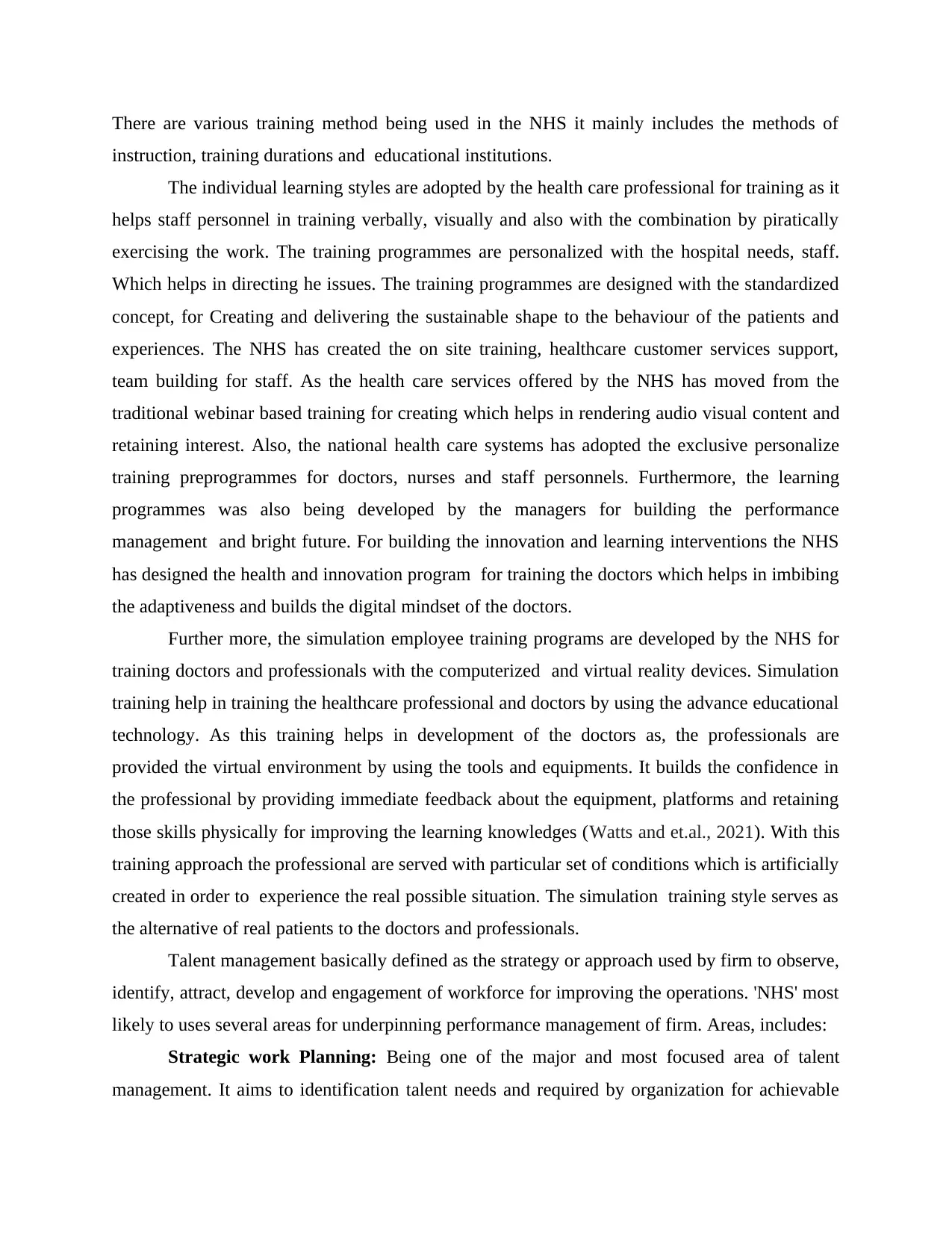
There are various training method being used in the NHS it mainly includes the methods of
instruction, training durations and educational institutions.
The individual learning styles are adopted by the health care professional for training as it
helps staff personnel in training verbally, visually and also with the combination by piratically
exercising the work. The training programmes are personalized with the hospital needs, staff.
Which helps in directing he issues. The training programmes are designed with the standardized
concept, for Creating and delivering the sustainable shape to the behaviour of the patients and
experiences. The NHS has created the on site training, healthcare customer services support,
team building for staff. As the health care services offered by the NHS has moved from the
traditional webinar based training for creating which helps in rendering audio visual content and
retaining interest. Also, the national health care systems has adopted the exclusive personalize
training preprogrammes for doctors, nurses and staff personnels. Furthermore, the learning
programmes was also being developed by the managers for building the performance
management and bright future. For building the innovation and learning interventions the NHS
has designed the health and innovation program for training the doctors which helps in imbibing
the adaptiveness and builds the digital mindset of the doctors.
Further more, the simulation employee training programs are developed by the NHS for
training doctors and professionals with the computerized and virtual reality devices. Simulation
training help in training the healthcare professional and doctors by using the advance educational
technology. As this training helps in development of the doctors as, the professionals are
provided the virtual environment by using the tools and equipments. It builds the confidence in
the professional by providing immediate feedback about the equipment, platforms and retaining
those skills physically for improving the learning knowledges (Watts and et.al., 2021). With this
training approach the professional are served with particular set of conditions which is artificially
created in order to experience the real possible situation. The simulation training style serves as
the alternative of real patients to the doctors and professionals.
Talent management basically defined as the strategy or approach used by firm to observe,
identify, attract, develop and engagement of workforce for improving the operations. 'NHS' most
likely to uses several areas for underpinning performance management of firm. Areas, includes:
Strategic work Planning: Being one of the major and most focused area of talent
management. It aims to identification talent needs and required by organization for achievable
instruction, training durations and educational institutions.
The individual learning styles are adopted by the health care professional for training as it
helps staff personnel in training verbally, visually and also with the combination by piratically
exercising the work. The training programmes are personalized with the hospital needs, staff.
Which helps in directing he issues. The training programmes are designed with the standardized
concept, for Creating and delivering the sustainable shape to the behaviour of the patients and
experiences. The NHS has created the on site training, healthcare customer services support,
team building for staff. As the health care services offered by the NHS has moved from the
traditional webinar based training for creating which helps in rendering audio visual content and
retaining interest. Also, the national health care systems has adopted the exclusive personalize
training preprogrammes for doctors, nurses and staff personnels. Furthermore, the learning
programmes was also being developed by the managers for building the performance
management and bright future. For building the innovation and learning interventions the NHS
has designed the health and innovation program for training the doctors which helps in imbibing
the adaptiveness and builds the digital mindset of the doctors.
Further more, the simulation employee training programs are developed by the NHS for
training doctors and professionals with the computerized and virtual reality devices. Simulation
training help in training the healthcare professional and doctors by using the advance educational
technology. As this training helps in development of the doctors as, the professionals are
provided the virtual environment by using the tools and equipments. It builds the confidence in
the professional by providing immediate feedback about the equipment, platforms and retaining
those skills physically for improving the learning knowledges (Watts and et.al., 2021). With this
training approach the professional are served with particular set of conditions which is artificially
created in order to experience the real possible situation. The simulation training style serves as
the alternative of real patients to the doctors and professionals.
Talent management basically defined as the strategy or approach used by firm to observe,
identify, attract, develop and engagement of workforce for improving the operations. 'NHS' most
likely to uses several areas for underpinning performance management of firm. Areas, includes:
Strategic work Planning: Being one of the major and most focused area of talent
management. It aims to identification talent needs and required by organization for achievable
⊘ This is a preview!⊘
Do you want full access?
Subscribe today to unlock all pages.

Trusted by 1+ million students worldwide
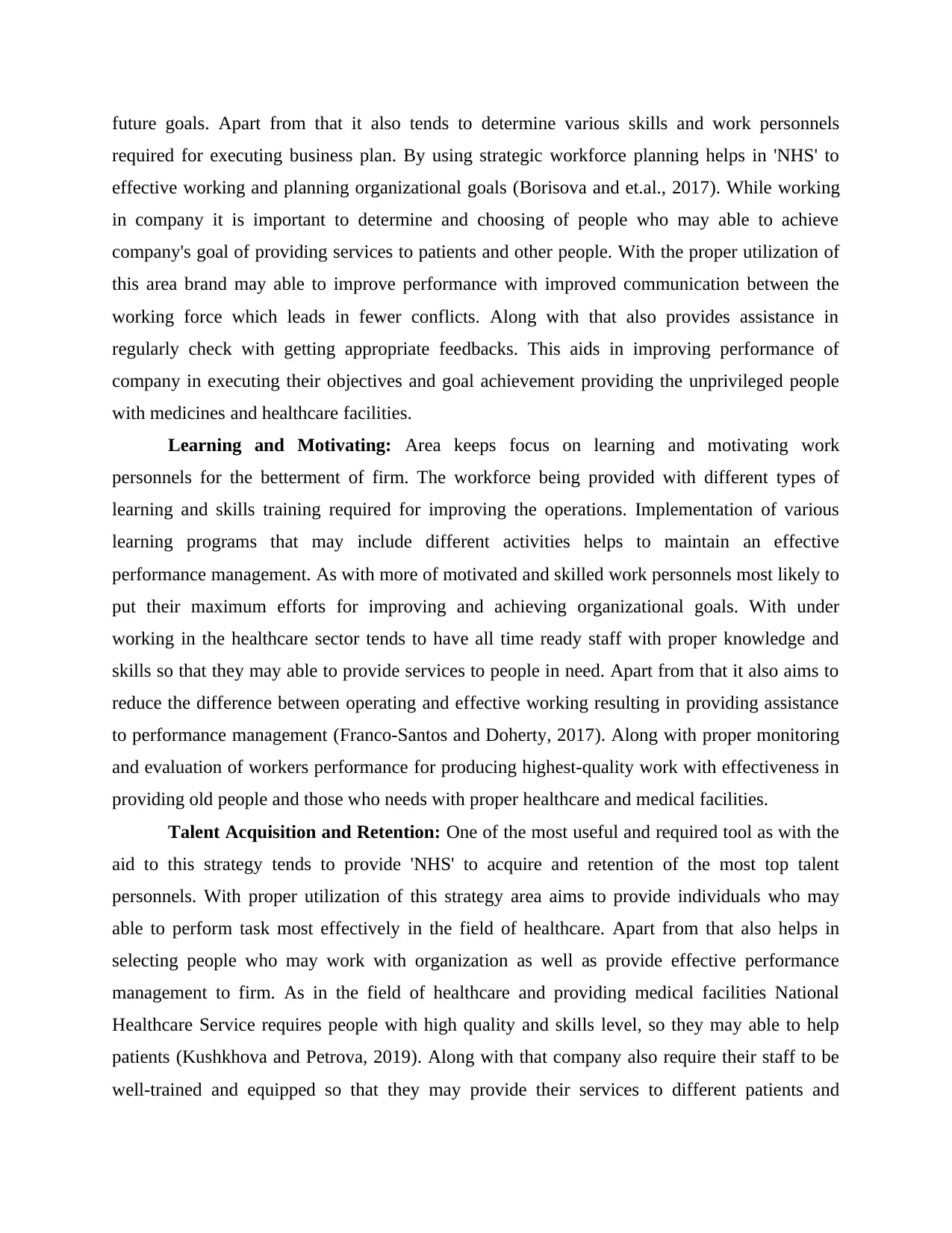
future goals. Apart from that it also tends to determine various skills and work personnels
required for executing business plan. By using strategic workforce planning helps in 'NHS' to
effective working and planning organizational goals (Borisova and et.al., 2017). While working
in company it is important to determine and choosing of people who may able to achieve
company's goal of providing services to patients and other people. With the proper utilization of
this area brand may able to improve performance with improved communication between the
working force which leads in fewer conflicts. Along with that also provides assistance in
regularly check with getting appropriate feedbacks. This aids in improving performance of
company in executing their objectives and goal achievement providing the unprivileged people
with medicines and healthcare facilities.
Learning and Motivating: Area keeps focus on learning and motivating work
personnels for the betterment of firm. The workforce being provided with different types of
learning and skills training required for improving the operations. Implementation of various
learning programs that may include different activities helps to maintain an effective
performance management. As with more of motivated and skilled work personnels most likely to
put their maximum efforts for improving and achieving organizational goals. With under
working in the healthcare sector tends to have all time ready staff with proper knowledge and
skills so that they may able to provide services to people in need. Apart from that it also aims to
reduce the difference between operating and effective working resulting in providing assistance
to performance management (Franco-Santos and Doherty, 2017). Along with proper monitoring
and evaluation of workers performance for producing highest-quality work with effectiveness in
providing old people and those who needs with proper healthcare and medical facilities.
Talent Acquisition and Retention: One of the most useful and required tool as with the
aid to this strategy tends to provide 'NHS' to acquire and retention of the most top talent
personnels. With proper utilization of this strategy area aims to provide individuals who may
able to perform task most effectively in the field of healthcare. Apart from that also helps in
selecting people who may work with organization as well as provide effective performance
management to firm. As in the field of healthcare and providing medical facilities National
Healthcare Service requires people with high quality and skills level, so they may able to help
patients (Kushkhova and Petrova, 2019). Along with that company also require their staff to be
well-trained and equipped so that they may provide their services to different patients and
required for executing business plan. By using strategic workforce planning helps in 'NHS' to
effective working and planning organizational goals (Borisova and et.al., 2017). While working
in company it is important to determine and choosing of people who may able to achieve
company's goal of providing services to patients and other people. With the proper utilization of
this area brand may able to improve performance with improved communication between the
working force which leads in fewer conflicts. Along with that also provides assistance in
regularly check with getting appropriate feedbacks. This aids in improving performance of
company in executing their objectives and goal achievement providing the unprivileged people
with medicines and healthcare facilities.
Learning and Motivating: Area keeps focus on learning and motivating work
personnels for the betterment of firm. The workforce being provided with different types of
learning and skills training required for improving the operations. Implementation of various
learning programs that may include different activities helps to maintain an effective
performance management. As with more of motivated and skilled work personnels most likely to
put their maximum efforts for improving and achieving organizational goals. With under
working in the healthcare sector tends to have all time ready staff with proper knowledge and
skills so that they may able to provide services to people in need. Apart from that it also aims to
reduce the difference between operating and effective working resulting in providing assistance
to performance management (Franco-Santos and Doherty, 2017). Along with proper monitoring
and evaluation of workers performance for producing highest-quality work with effectiveness in
providing old people and those who needs with proper healthcare and medical facilities.
Talent Acquisition and Retention: One of the most useful and required tool as with the
aid to this strategy tends to provide 'NHS' to acquire and retention of the most top talent
personnels. With proper utilization of this strategy area aims to provide individuals who may
able to perform task most effectively in the field of healthcare. Apart from that also helps in
selecting people who may work with organization as well as provide effective performance
management to firm. As in the field of healthcare and providing medical facilities National
Healthcare Service requires people with high quality and skills level, so they may able to help
patients (Kushkhova and Petrova, 2019). Along with that company also require their staff to be
well-trained and equipped so that they may provide their services to different patients and
Paraphrase This Document
Need a fresh take? Get an instant paraphrase of this document with our AI Paraphraser
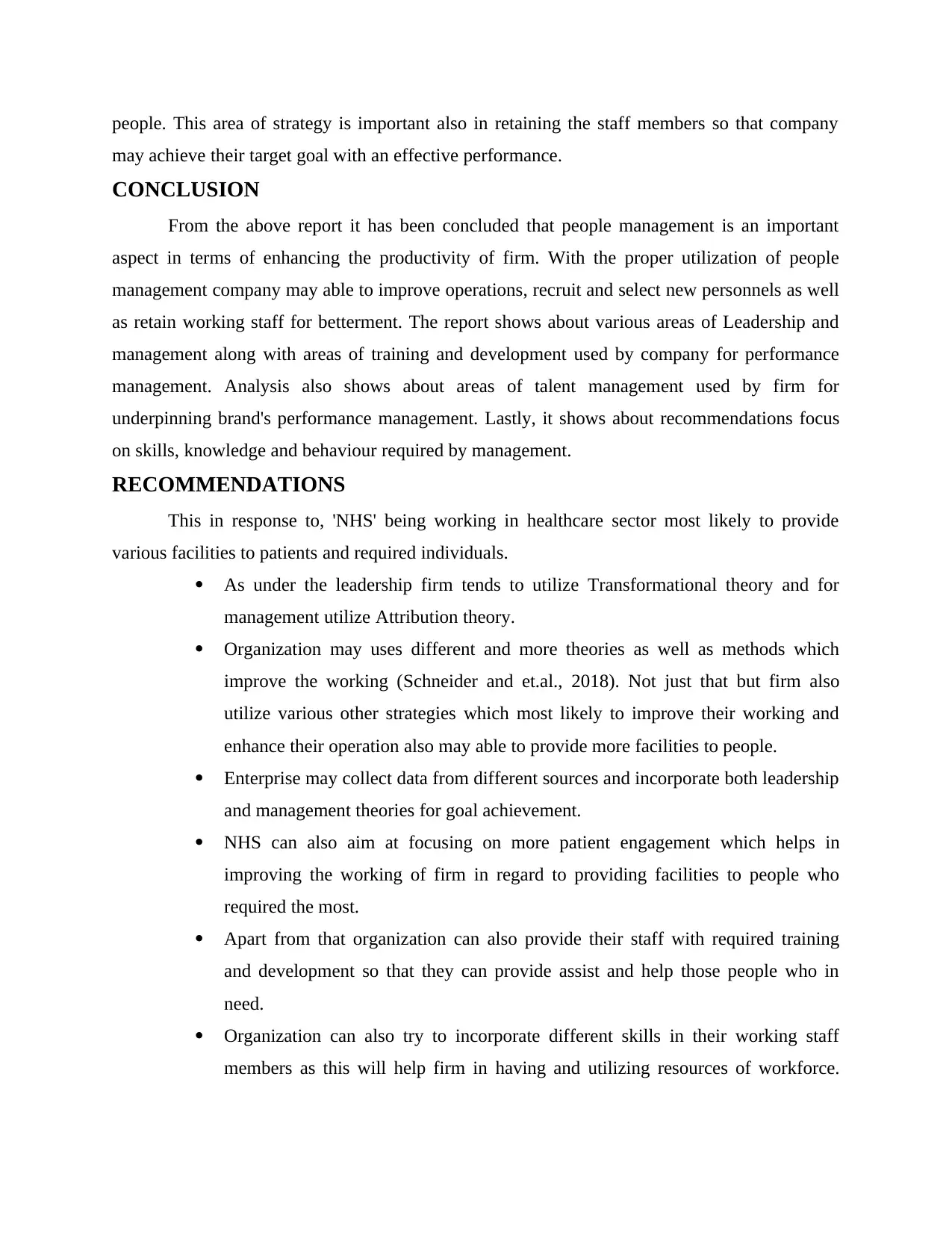
people. This area of strategy is important also in retaining the staff members so that company
may achieve their target goal with an effective performance.
CONCLUSION
From the above report it has been concluded that people management is an important
aspect in terms of enhancing the productivity of firm. With the proper utilization of people
management company may able to improve operations, recruit and select new personnels as well
as retain working staff for betterment. The report shows about various areas of Leadership and
management along with areas of training and development used by company for performance
management. Analysis also shows about areas of talent management used by firm for
underpinning brand's performance management. Lastly, it shows about recommendations focus
on skills, knowledge and behaviour required by management.
RECOMMENDATIONS
This in response to, 'NHS' being working in healthcare sector most likely to provide
various facilities to patients and required individuals.
As under the leadership firm tends to utilize Transformational theory and for
management utilize Attribution theory.
Organization may uses different and more theories as well as methods which
improve the working (Schneider and et.al., 2018). Not just that but firm also
utilize various other strategies which most likely to improve their working and
enhance their operation also may able to provide more facilities to people.
Enterprise may collect data from different sources and incorporate both leadership
and management theories for goal achievement.
NHS can also aim at focusing on more patient engagement which helps in
improving the working of firm in regard to providing facilities to people who
required the most.
Apart from that organization can also provide their staff with required training
and development so that they can provide assist and help those people who in
need.
Organization can also try to incorporate different skills in their working staff
members as this will help firm in having and utilizing resources of workforce.
may achieve their target goal with an effective performance.
CONCLUSION
From the above report it has been concluded that people management is an important
aspect in terms of enhancing the productivity of firm. With the proper utilization of people
management company may able to improve operations, recruit and select new personnels as well
as retain working staff for betterment. The report shows about various areas of Leadership and
management along with areas of training and development used by company for performance
management. Analysis also shows about areas of talent management used by firm for
underpinning brand's performance management. Lastly, it shows about recommendations focus
on skills, knowledge and behaviour required by management.
RECOMMENDATIONS
This in response to, 'NHS' being working in healthcare sector most likely to provide
various facilities to patients and required individuals.
As under the leadership firm tends to utilize Transformational theory and for
management utilize Attribution theory.
Organization may uses different and more theories as well as methods which
improve the working (Schneider and et.al., 2018). Not just that but firm also
utilize various other strategies which most likely to improve their working and
enhance their operation also may able to provide more facilities to people.
Enterprise may collect data from different sources and incorporate both leadership
and management theories for goal achievement.
NHS can also aim at focusing on more patient engagement which helps in
improving the working of firm in regard to providing facilities to people who
required the most.
Apart from that organization can also provide their staff with required training
and development so that they can provide assist and help those people who in
need.
Organization can also try to incorporate different skills in their working staff
members as this will help firm in having and utilizing resources of workforce.
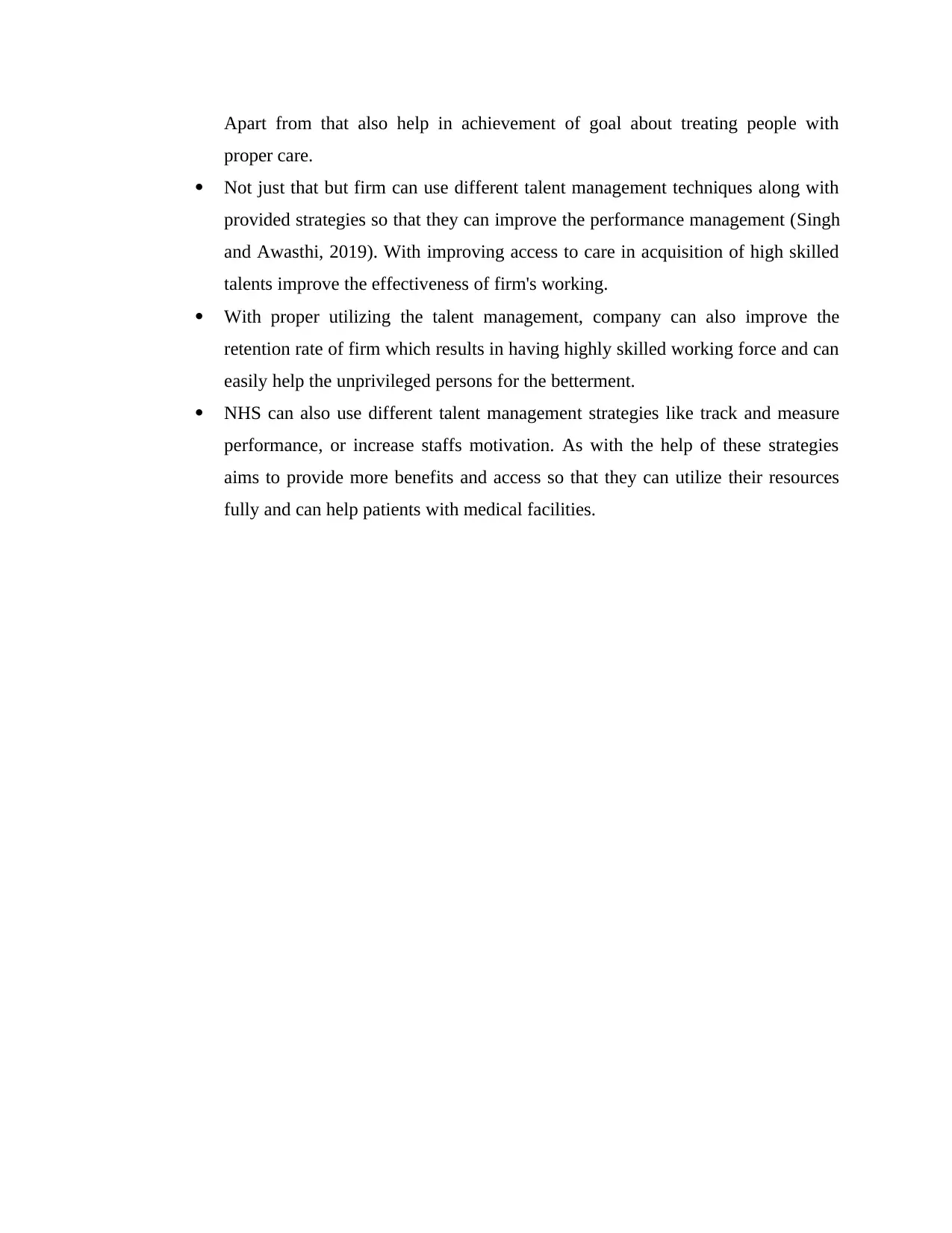
Apart from that also help in achievement of goal about treating people with
proper care.
Not just that but firm can use different talent management techniques along with
provided strategies so that they can improve the performance management (Singh
and Awasthi, 2019). With improving access to care in acquisition of high skilled
talents improve the effectiveness of firm's working.
With proper utilizing the talent management, company can also improve the
retention rate of firm which results in having highly skilled working force and can
easily help the unprivileged persons for the betterment.
NHS can also use different talent management strategies like track and measure
performance, or increase staffs motivation. As with the help of these strategies
aims to provide more benefits and access so that they can utilize their resources
fully and can help patients with medical facilities.
proper care.
Not just that but firm can use different talent management techniques along with
provided strategies so that they can improve the performance management (Singh
and Awasthi, 2019). With improving access to care in acquisition of high skilled
talents improve the effectiveness of firm's working.
With proper utilizing the talent management, company can also improve the
retention rate of firm which results in having highly skilled working force and can
easily help the unprivileged persons for the betterment.
NHS can also use different talent management strategies like track and measure
performance, or increase staffs motivation. As with the help of these strategies
aims to provide more benefits and access so that they can utilize their resources
fully and can help patients with medical facilities.
⊘ This is a preview!⊘
Do you want full access?
Subscribe today to unlock all pages.

Trusted by 1+ million students worldwide
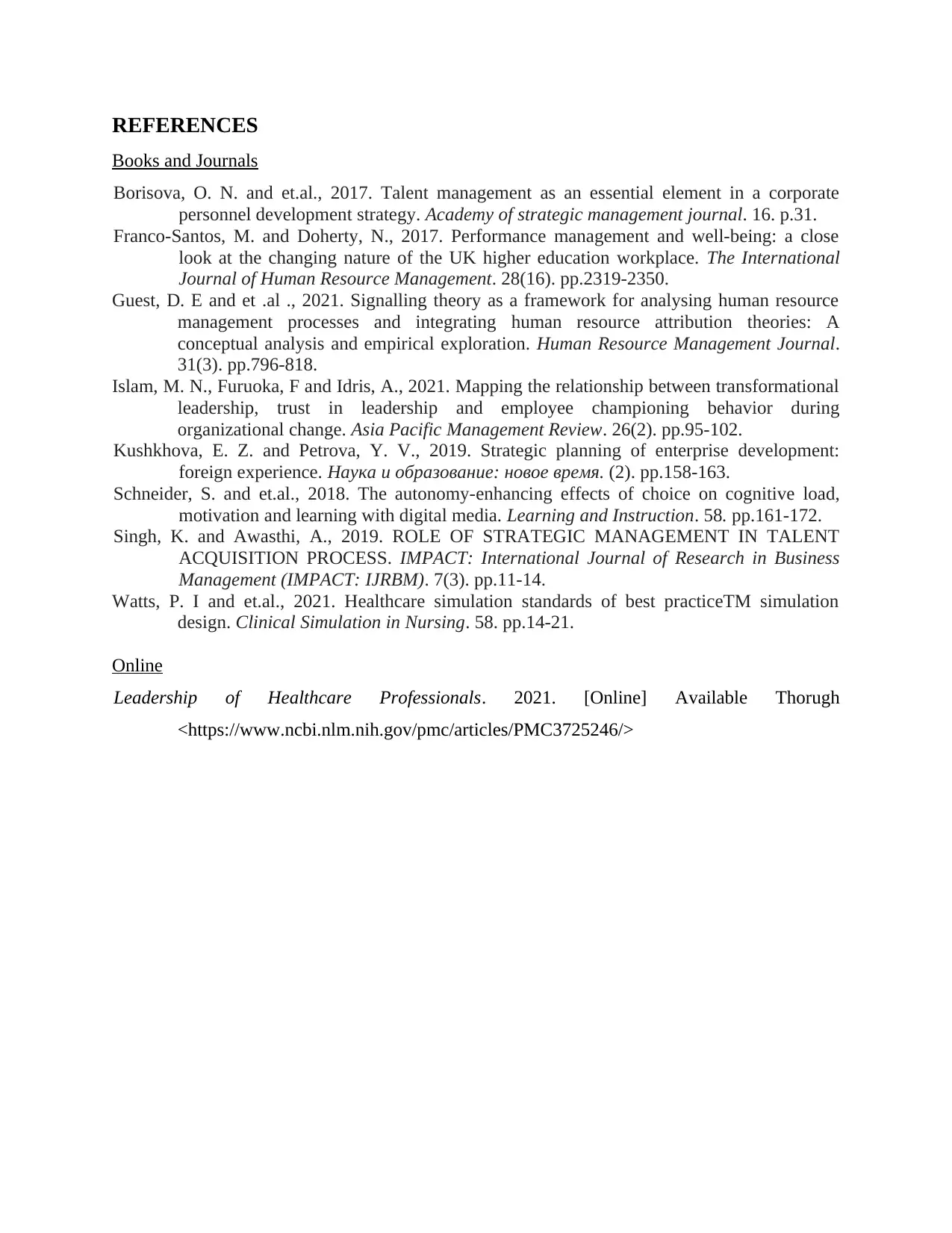
REFERENCES
Books and Journals
Borisova, O. N. and et.al., 2017. Talent management as an essential element in a corporate
personnel development strategy. Academy of strategic management journal. 16. p.31.
Franco-Santos, M. and Doherty, N., 2017. Performance management and well-being: a close
look at the changing nature of the UK higher education workplace. The International
Journal of Human Resource Management. 28(16). pp.2319-2350.
Guest, D. E and et .al ., 2021. Signalling theory as a framework for analysing human resource
management processes and integrating human resource attribution theories: A
conceptual analysis and empirical exploration. Human Resource Management Journal.
31(3). pp.796-818.
Islam, M. N., Furuoka, F and Idris, A., 2021. Mapping the relationship between transformational
leadership, trust in leadership and employee championing behavior during
organizational change. Asia Pacific Management Review. 26(2). pp.95-102.
Kushkhova, E. Z. and Petrova, Y. V., 2019. Strategic planning of enterprise development:
foreign experience. Наука и образование: новое время. (2). pp.158-163.
Schneider, S. and et.al., 2018. The autonomy-enhancing effects of choice on cognitive load,
motivation and learning with digital media. Learning and Instruction. 58. pp.161-172.
Singh, K. and Awasthi, A., 2019. ROLE OF STRATEGIC MANAGEMENT IN TALENT
ACQUISITION PROCESS. IMPACT: International Journal of Research in Business
Management (IMPACT: IJRBM). 7(3). pp.11-14.
Watts, P. I and et.al., 2021. Healthcare simulation standards of best practiceTM simulation
design. Clinical Simulation in Nursing. 58. pp.14-21.
Online
Leadership of Healthcare Professionals. 2021. [Online] Available Thorugh
<https://www.ncbi.nlm.nih.gov/pmc/articles/PMC3725246/>
Books and Journals
Borisova, O. N. and et.al., 2017. Talent management as an essential element in a corporate
personnel development strategy. Academy of strategic management journal. 16. p.31.
Franco-Santos, M. and Doherty, N., 2017. Performance management and well-being: a close
look at the changing nature of the UK higher education workplace. The International
Journal of Human Resource Management. 28(16). pp.2319-2350.
Guest, D. E and et .al ., 2021. Signalling theory as a framework for analysing human resource
management processes and integrating human resource attribution theories: A
conceptual analysis and empirical exploration. Human Resource Management Journal.
31(3). pp.796-818.
Islam, M. N., Furuoka, F and Idris, A., 2021. Mapping the relationship between transformational
leadership, trust in leadership and employee championing behavior during
organizational change. Asia Pacific Management Review. 26(2). pp.95-102.
Kushkhova, E. Z. and Petrova, Y. V., 2019. Strategic planning of enterprise development:
foreign experience. Наука и образование: новое время. (2). pp.158-163.
Schneider, S. and et.al., 2018. The autonomy-enhancing effects of choice on cognitive load,
motivation and learning with digital media. Learning and Instruction. 58. pp.161-172.
Singh, K. and Awasthi, A., 2019. ROLE OF STRATEGIC MANAGEMENT IN TALENT
ACQUISITION PROCESS. IMPACT: International Journal of Research in Business
Management (IMPACT: IJRBM). 7(3). pp.11-14.
Watts, P. I and et.al., 2021. Healthcare simulation standards of best practiceTM simulation
design. Clinical Simulation in Nursing. 58. pp.14-21.
Online
Leadership of Healthcare Professionals. 2021. [Online] Available Thorugh
<https://www.ncbi.nlm.nih.gov/pmc/articles/PMC3725246/>
1 out of 10
Related Documents
Your All-in-One AI-Powered Toolkit for Academic Success.
+13062052269
info@desklib.com
Available 24*7 on WhatsApp / Email
![[object Object]](/_next/static/media/star-bottom.7253800d.svg)
Unlock your academic potential
Copyright © 2020–2026 A2Z Services. All Rights Reserved. Developed and managed by ZUCOL.





